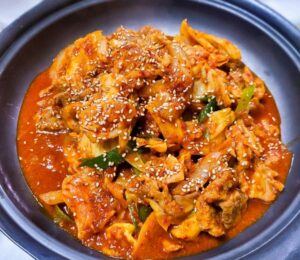Jeyuk-bokkeum, also known as spicy stir-fried pork, is a popular Korean dish that brings together the bold and vibrant flavors of Korean cuisine. This dish is not only delicious but also packed with nutrients, making it a healthy addition to your meal plan. In this blog, we’ll delve into the details of jeyuk-bokkeum, its health benefits, how to make it, and the best ways to enjoy it with complementary foods. Let’s get started on this culinary adventure!

What is Jeyuk-Bokkeum?
Jeyuk-bokkeum is a traditional Korean dish made by marinating pork in a spicy gochujang (Korean red chili paste) sauce and then stir-frying it with vegetables. The name “jeyuk” refers to pork, and “bokkeum” means stir-fried. This dish is known for its fiery flavor and tender, juicy pork pieces, often complemented by a variety of vegetables like onions, bell peppers, and carrots.
Health Benefits of Jeyuk-Bokkeum
Jeyuk-bokkeum is not only a flavorful delight but also offers several health benefits: Rich in Protein: Pork is a great source of high-quality protein, which is essential for muscle repair and growth.
- Packed with Vitamins: The vegetables used in jeyuk-bokkeum provide a good dose of vitamins A, C, and K.
- Boosts Metabolism: The capsaicin in gochujang can boost metabolism and help in weight management.
- Immune Support: Ingredients like garlic and ginger used in the marinade have immune-boosting properties.
Ingredients for 2 Servings
Here’s what you’ll need to make jeyuk-bokkeum for two people:

- Pork: 300g pork belly or shoulder, thinly sliced
- Onion: 1 medium, sliced
- Carrot: 1 small, julienned
- Bell Pepper: 1 medium, sliced
- Green Onion: 2 stalks, chopped
- Garlic: 2 cloves, minced
- Ginger: 1 tsp, grated
- Gochujang: 2 tbsp
- Soy Sauce: 1 tbsp
- Sugar: 1 tbsp
- Sesame Oil: 1 tbsp
- Sesame Seeds: 1 tsp
- Cooking Oil: 1 tbsp
Step-by-Step Instructions
Preparing the Marinade
- Combine the Marinade Ingredients: In a mixing bowl, combine 2 tbsp gochujang, 1 tbsp soy sauce, 1 tbsp sugar, 1 tbsp sesame oil, 1 tsp grated ginger, and 2 minced garlic cloves. Mix well until the sugar dissolves and the ingredients are well incorporated.
- Marinate the Pork: Add the sliced pork to the bowl and mix well to ensure all pieces are evenly coated with the marinade. Cover and let it marinate in the refrigerator for at least 30 minutes, or overnight for a deeper flavor.
Stir-Frying the Jeyuk-Bokkeum
- Heat the Oil: In a large skillet or wok, heat 1 tbsp of cooking oil over medium-high heat.
- Cook the Pork: Add the marinated pork to the skillet and stir-fry for about 5-7 minutes, or until the pork is fully cooked and slightly caramelized.
- Add Vegetables: Add the sliced onion, julienned carrot, and bell pepper to the skillet. Stir-fry for an additional 3-4 minutes until the vegetables are tender but still crisp.
- Finish with Green Onions and Sesame Seeds: Toss in the chopped green onions and stir-fry for another minute. Sprinkle with sesame seeds before serving.
Tips for Making the Perfect Jeyuk-Bokkeum
- Choosing the Pork: Opt for pork belly for a richer flavor or pork shoulder for a leaner option.
- Vegetable Variations: Feel free to add other vegetables like mushrooms, zucchini, or cabbage to the stir-fry.
- Spice Level: Adjust the amount of gochujang based on your spice preference. You can also add a dash of gochugaru (Korean chili flakes) for extra heat.
Foods to Pair with Jeyuk-Bokkeum
To create a well-rounded meal, consider serving jeyuk-bokkeum with these complementary dishes:
- Steamed Rice: The mild flavor of steamed rice balances the spiciness of the stir-fry.
- Kimchi: This fermented cabbage dish adds a tangy and spicy kick that complements the flavors of jeyuk-bokkeum.
- Doenjang-Jjigae: A light and savory soup can help cleanse the palate between bites.
- Vegetable Side Dishes: Banchan like spinach namul or cucumber kimchi provide refreshing contrast.
Storing and Reheating Jeyuk-Bokkeum
If you have leftovers, jeyuk-bokkeum can be stored and reheated easily:
- Refrigeration: Store the cooked jeyuk-bokkeum in an airtight container in the refrigerator for up to 3 days.
- Freezing: For longer storage, freeze the jeyuk-bokkeum in a freezer-safe container for up to 2 months. Thaw in the refrigerator before reheating.
- Reheating: Reheat the jeyuk-bokkeum in a skillet over medium heat until warmed through. Add a splash of water if needed to prevent it from drying out.
Nutritional Information
For those mindful of their dietary intake, here’s a rough estimate of the nutritional content per serving of jeyuk-bokkeum:
- Calories: Approximately 400-450 kcal
- Protein: 25-30g
- Fat: 20-25g
- Carbohydrates: 15-20g
These values can vary based on the specific ingredients and portions used.
Conclusion
Jeyuk-bokkeum is a flavorful, nutritious, and versatile dish that brings the vibrant tastes of Korean cuisine to your table. With its rich protein content, array of vegetables, and health-boosting ingredients, it’s a meal that satisfies both the palate and the body. By following this recipe, you can easily create a delicious and healthy version of jeyuk-bokkeum at home. Enjoy it with steamed rice, kimchi, and other banchan for a complete and satisfying meal. Happy cooking!
